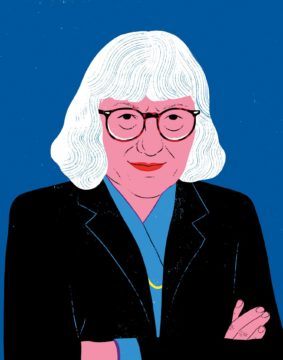Giles Harvey in The New Yorker:
 Few writers have borne witness to the slow-healing bruises of early neglect more memorably than Cynthia Ozick, whose own first novel, “Trust” (1966), didn’t appear until she’d reached the practically geriatric age of thirty-seven. “There one sits, reading and writing, month after month, year after year,” Ozick has said of her long pre-print limbo. “There one sits, envying other young writers who have achieved a grain more than oneself. Without the rush and brush and crush of the world, one becomes hollowed out. The cavity fills with envy.” As it happened, “Trust,” a six-hundred-and-fifty-page homage to Henry James, Ozick’s once and future inspirator, did little to enhance her name recognition. (“Nobody has ever read it,” she said several decades later, only mildly overstating the case.) In the end, it was envy itself that became the means of her literary ascent.
Few writers have borne witness to the slow-healing bruises of early neglect more memorably than Cynthia Ozick, whose own first novel, “Trust” (1966), didn’t appear until she’d reached the practically geriatric age of thirty-seven. “There one sits, reading and writing, month after month, year after year,” Ozick has said of her long pre-print limbo. “There one sits, envying other young writers who have achieved a grain more than oneself. Without the rush and brush and crush of the world, one becomes hollowed out. The cavity fills with envy.” As it happened, “Trust,” a six-hundred-and-fifty-page homage to Henry James, Ozick’s once and future inspirator, did little to enhance her name recognition. (“Nobody has ever read it,” she said several decades later, only mildly overstating the case.) In the end, it was envy itself that became the means of her literary ascent.
…To publish a novel in your early twenties is impressive; to publish one at the age of ninety-three is something else altogether. That is the age that Ozick turns on April 17th, a few days after the publication date of her latest book, which bears the self-ironic title “Antiquities” (Knopf). A brisk work of some thirty thousand words, it explores her favorite subjects—envy and ambition, the moral peril of idolatry—in her favorite form. As you might expect, it also has much to say about last things, and the long perspectives open to the human mind as it approaches its terminus.
“The limitless void that awaits us” is much on the mind of Ozick’s narrator, as well it might be. Lloyd Wilkinson Petrie, a retired lawyer, is getting on in years. It is 1949, and Petrie has come to live at Temple Academy, the esteemed Westchester boarding school he attended in his youth. The school, long defunct, has lately been converted into a retirement home for its trustees, all former pupils. Each has agreed to write a short memoir of his school days as part of a sort of institutional history. What sounds like a harmless exercise in group nostalgia soon takes on an air of the macabre as Petrie’s recollections bring into the light things better left in darkness.
More here.
